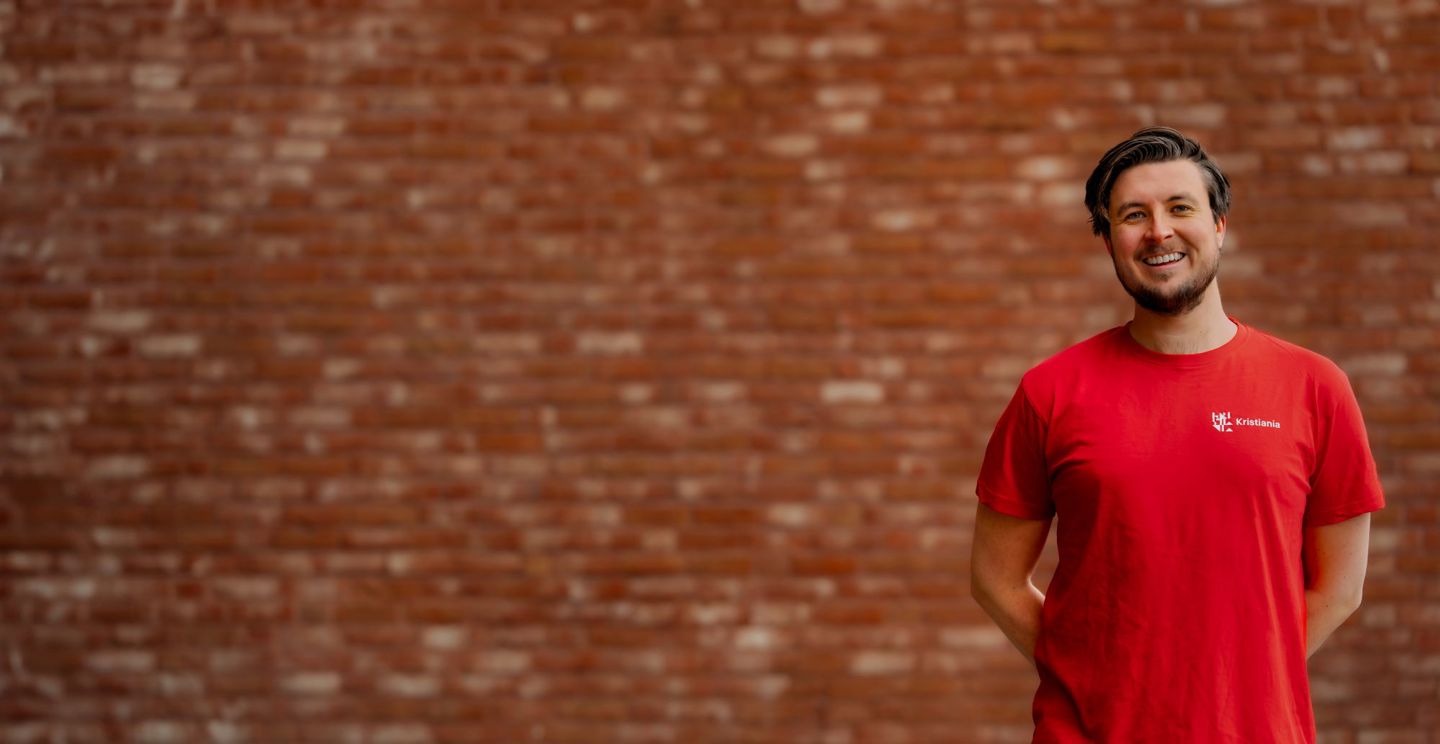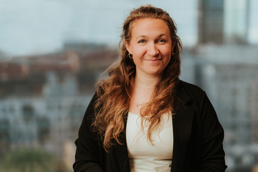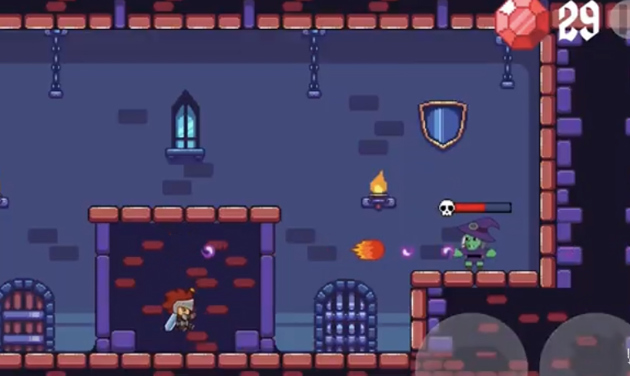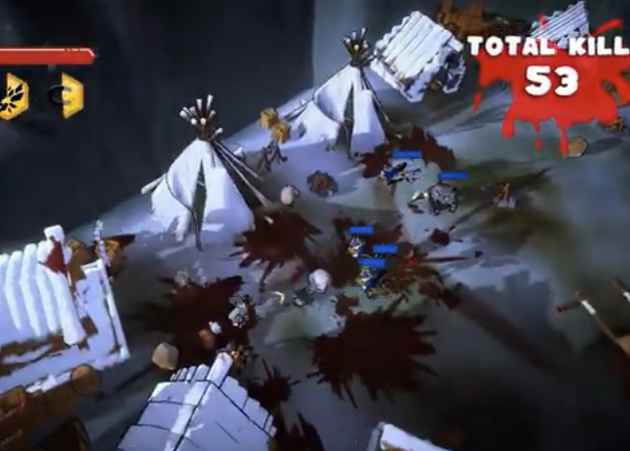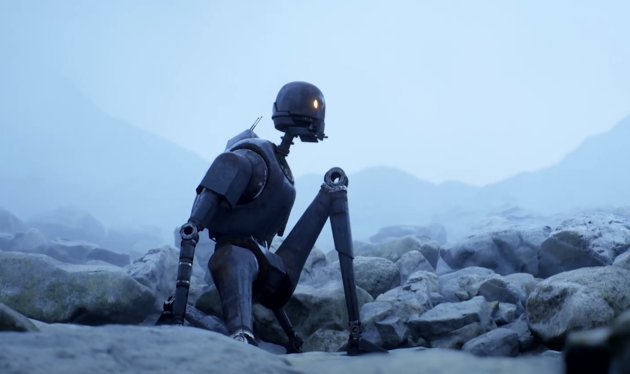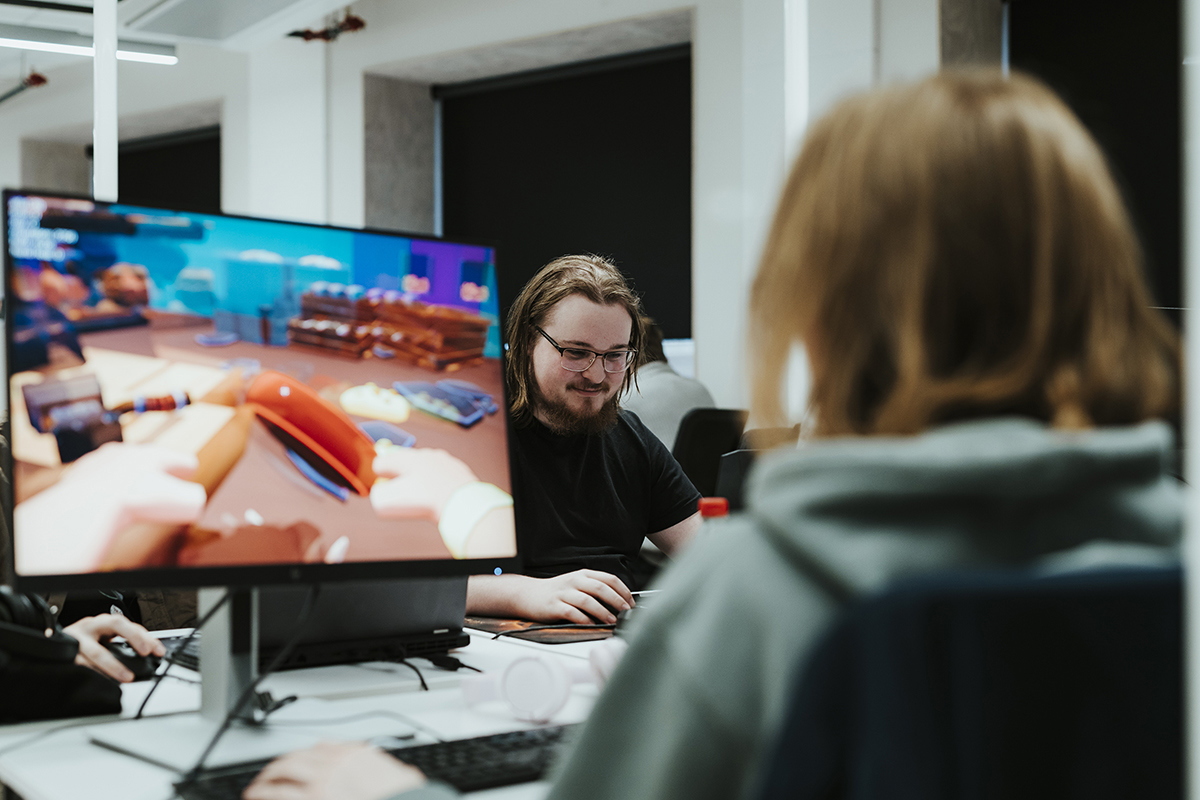
Computer Arts
This programme teaches you to master 3D graphics, animation, visual effects, or game design through hands-on, industry-focused training that prepares you for a successful career in the digital arts job market.
Key information
Specialized career path
Choose from four in-demand specializations—3D Graphics, Animation, Visual Effects, or Game Design—tailored to prepare you for specific roles in the digital arts industry.Global opportunities
Benefit from international exchange programs, industry connections, and internships with top Scandinavian studios to kickstart your career.Hands-on training
Gain practical experience using Kristiania’s state-of-the-art facilities, industry-standard software, and real-world projects to build your professional showreel.Important deadlines
The application deadline is April 15th. The documentation deadline for diplomas and certificates is July 1st.Admission requirements
Higher Education Entrance Qualification or the equivalent.Tuition fees
59 500 kr per semester*. Additional information about prices can be found here.
- Bachelor
- Fall 2025
- Full-time
- 180 Points
- Oslo
- 3 years
- English
Learning outcomes
The program emphasizes hands-on experience, interdisciplinary collaboration, and real-world applications, ensuring you are well-equipped to design, animate, and produce professional-quality work. Additionally, you'll build a strong portfolio and develop essential skills in teamwork, problem-solving, and project management, all of which are critical for success in the fast-paced digital arts industry.
The subjects you’ll focus on include:
- Computer Arts Production
- Specialized subjects such as cinematography, prototyping or animation
- Media Arts Innovation Lab
Study model
- COA200Computer Arts Production 1
The purpose of the course is to give the student a holistic experience with a larger practical project work involving their field of study.
The student will plan and carry out a comprehensive project case in a group, and will both receive training in interdisciplinary teamwork and in using modern techniques, methods and tools for production and organization of a larger project. The student must be able to understand different phases of the production as well as different team roles and how each group member contributes.
- 3DG114Realtime 3D Graphics
The subject is about how to create good and aesthetic design and interactions in prototypes made with real-time 3D graphics. The students become familiar with the possibilities of the development environment and effective use of this. Students learn to use advanced materials and lighting in interactive scenes.
- 3DG215Architectural Visualization Theory and Practice
In this course students will learn how to visualize architecture or constructions in the different phases of a project. They are introduced to tools that are used for architectural visualization, and techniques applied for this.
- ANI200Acting for Animators
The course explores how acting techniques can be used in animation. To create characters with emotions and empathy, students are introduced to various aspects of acting techniques, including facial expressions for scenes with dialogue and improvisation. Through practical exercises, students will develop a deeper understanding of how to create scenes with characters that think, breathe, feel, and act.
Students will also learn how to film themselves for reference and how to effectively use this material by analyzing and applying these insights to their animations.
- ANI203Animation 3
Animation 3 builds on the principles from Animation 1 and Animation 2. This course takes you deeper into the fascinating world of storytelling, acting techniques, and dramaturgy to create engaging scenes.
During Animation 3, you will not only learn advanced animation techniques, such as facial animation, but also how to bring characters to life and imbue them with empathy throughout their journey. From miming to lively scenes with dialogue, we explore how to convey conflict, emotions, and personality through animation.
We focus on detailing and polishing in the final phase of the animation process. Here, you will fine-tune asymmetry in posing, both in the body and face, as well as variations in curves, spacing, and all the small details that bring the character to life.
Students will gain extensive experience in giving and receiving constructive feedback on their work.
- SPD209Narrative and Level Design
In this course, the student will get a basic introduction to narrative structures linked to level design and visual storytelling techniques in games. The student will explore how video games tell stories, and how well-known principles from game and level design can enhance the narrative through mechanics, theme and mood. Through the course, the student will be introduced to narrative and level design, and gain practical experience with the design, development and iteration of virtual areas.
- SPD116Prototyping
The work in this course will familiarize the student with various processes related to prototyping and testing, as well as different methods for conducting these activities. The student will be able to plan, develop, and test game prototypes based on established design concepts, evaluate the design based on testing outcomes, and reflect on the results.
- VFX221Cinematography
The course gives students an introduction to photographic technique with a focus on composition and exposure/lighting. Students will learn to see subjects through the camera lens. Students also learn film as visual storytelling and how to use image composition, lighting and camera movement to tell a story. By filming their own VFX sequences, the students will increase their understanding of film and VFX techniques.
- VFX2223D for VFX
In this course the students will get an introduction to 3D graphics used as a tool towards work with visual effects (VFX). The students will gain basic skills in lighting and rendering of digital 3D objects with a view to integration in a VFX work process.
- WFM200Media Art Innovation Lab
Media Art Innovation Lab (MAIL) er et tverrfaglig fellesemne ved Westerdals Institutt for Film og Medier (WIFM).
Dette emnet fungerer som et laboratorium for innovasjon, fremmer nye tenkemåter og samarbeidsmetoder, og gir studentene muligheten til å utforske nyskapende, kreative og eksperimentelle tilnærminger innenfor medie- og kunstfeltet.
En sentral del av emnet er tverrfaglig samarbeid. Studenter fra flere studieprogram jobber sammen i grupper for å planlegge, utvikle og gjennomføre prosjektarbeid. Dette bidrar til å utvikle studentenes samarbeidskompetanse, og gir dem muligheten til å respondere på og kommentere samfunnsspørsmål og den tiden vi lever i.
Studentene vil også bli introdusert for verdiperspektiver som bærekraftige vurderinger og prinsipper for grønn produksjon, samt prinsipper for mangfold og integrering.
I dette emnet er det studentene som driver innovasjon og kreative prosesser, og utvikler kunnskap og ny innsikt i en undervisningskontekst der de er aktive deltakere i læringsprosessen.
- UTV999BA30ENExchange Studies
- VAL999-7ENGElective course
- COA300Computer Arts Production 2
This course will provide students with relevant experience in executing a major practical project within their field of study, with high standards for quality and execution. The production could be a large-scale game, film/animation, VFX, or visualization project.
- COA360Bachelor Production
The student will gain professional experience by completing a project in a company, establishing their own business, or participating in a self-defined comprehensive research project. In a practical research project, the student will demonstrate broad knowledge of central topics and research methodology, and show skills in teamwork, project management methods, and relevant tools. The project should have a professional character and be of high quality.
The course also includes a practical introduction to prepare the student for the industry. The student will gain knowledge about industry-specific law, the industry’s institutions and working methods, as well as tools such as application writing and self-presentation.
- 3DG217Realtime 3D Graphics 2
- ANI304Animation 4
The course is an advanced animation course focusing on dramaturgy and behaviour for humans, animals, and creatures. The student will have the opportunity to develop their own expression and style. High standards are set for quality and execution in the last animation polishing phase.
- SPD324System Design 2
This course aims to provide students with a deeper understanding of system design through the lens of game balancing. Students will be introduced to advanced system design, which will be explored in detail. The course will cover various game mechanics, focusing on how these can be utilized, combined, and balanced to create a meaningful experience for the player.
- VFX220Compositing 3
Compositing 3 builds on the Compositing 2 course. The focus is on more advanced projects and typical advanced compositing tasks the students will encounter in the industry as well as completion of shots. Students will get to know some of the latest techniques and be able to make the final touches needed to deliver professional shots.
Career opportunities
Examples of jobs include:
- Visual Effects (VFX) Artist
- Game Designer
- 3D Artist
- Interactive Media Designer
- Virtual Reality (VR) Developer
Meet the faculty
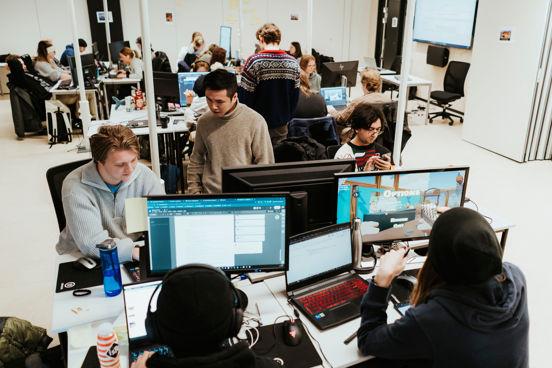
Our staff
- Assistant Professor Trygve Bjellvåg has worked at FunCom and has been teaching game design for more than 10 years.
- Ivar Kjellmo is a visual artist with extensive industry experience and is one of the authors behind Norway's first textbook on 3D graphics.
- Morten Moen is a former VFX Supervisor at Storm Studios. He has been instrumental in building the VFX industry in Norway and has worked on over 60 films and TV series.
- Hans Gunnar Brekke has many years of experience from major productions abroad and has applied his experience from The Jungle Book, Twilight, and The Hobbit films in the development of the program.
How we work
- Everyday life as a student in Kristiania's Bachelor in Computer Arts is dynamic and hands-on, with a blend of lectures, workshops, and collaborative project work. You’ll spend your time in state-of-the-art facilities honing your technical skills on industry-standard software.
- Group projects are a central part of the experience, where you'll work closely with peers from different specializations, simulating real-world production environments. Outside of class, you’ll engage in self-directed work, refining your creative concepts and building your professional portfolio.
- The program also offers guest lectures, industry events, and mentorship from faculty, making each day a step closer to a career in the digital arts.
Application process
Important deadlines
Deadline for submitting an application for non-EU/EEA applicants who needs a study permit in order to study in Norway is March 15th. The deadline for submitting transcripts and certificates is April 15th.Admission informationProcessing time
For study programs with rolling admissions, you will receive a conditional offer within 1–3 days of submitting the application, if there are available slots for the study program you applied for.Processing timeHow to apply
Mitt Kristiania is where you accept the offer and upload necessary documentation for your qualifications.Admission information
Semester registration
You must register and confirm your individual education plan before you are reported as an active student to the Norwegian State Educational Loan Fund, and to gain access to your subjects in Canvas, the learning platform.Semester registrationSiO (Oslo) and Sammen (Bergen)
SiO and Sammen offers housing, health services, kindergardens, fitness centers and much more to its members.SiO (Oslo) and Sammen (Bergen)Loans and grants
All our study programs are publicly approved and give the right to apply for loans and grants from the Norwegian State Educational Loan Fund (Lånekassen).Loans and grants
Services and adaptations
As a student, you can get guidance, adaptation and follow-up on study-related questions and challenges. We have a duty of confidentiality.Services and adaptationsMitt Kristiania
This is where you get an overview of your schedule, syllabus, services and other tools you need as a student.Mitt KristianiaStudent ID card
As a new student, you can have a student card made on all our campuses. Your student card serves as an access card at the college’s campuses, ID for exams, payment card for printers and library card.Student ID card
Any questions?
